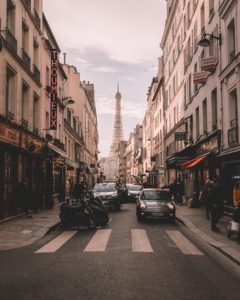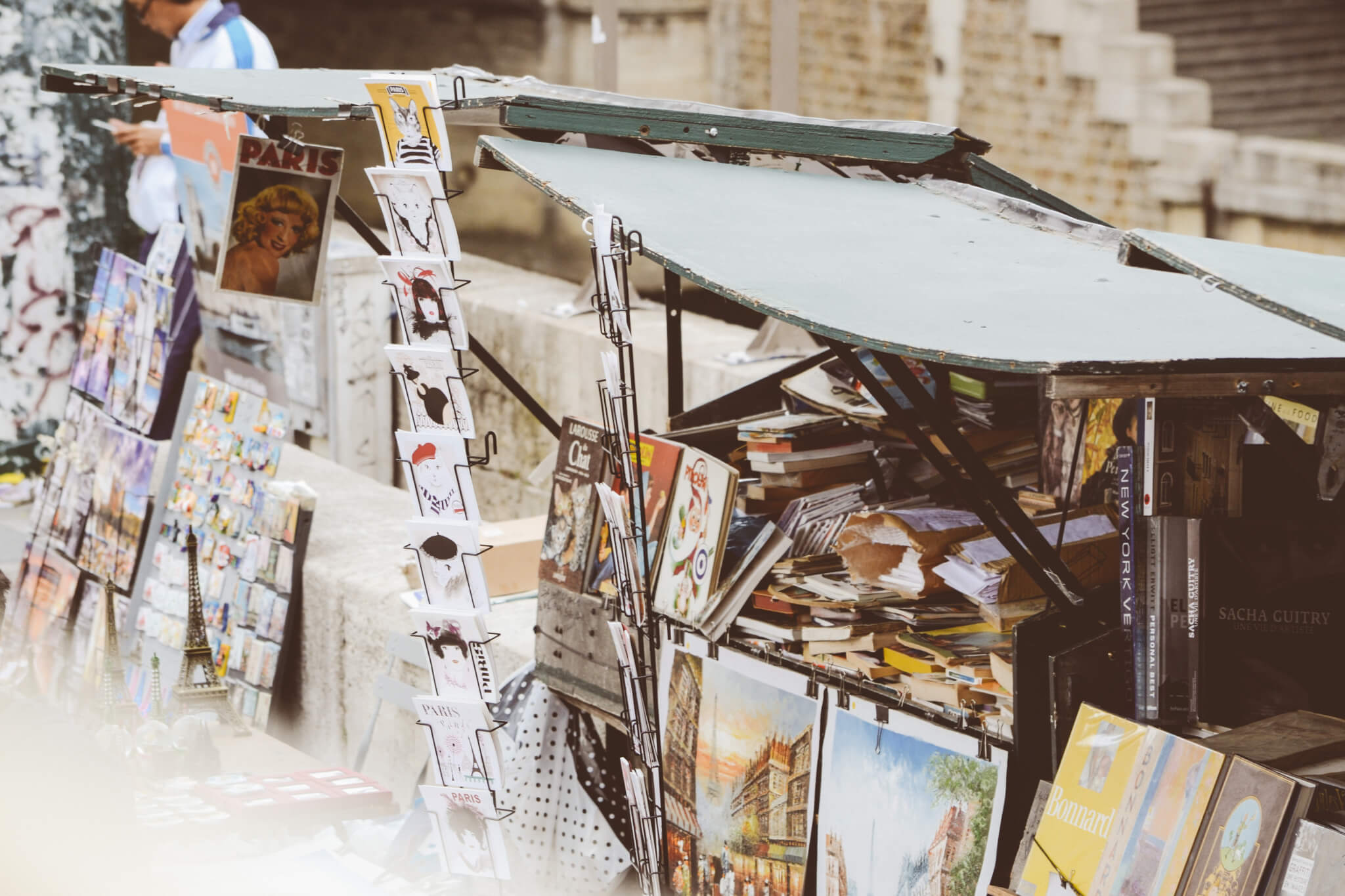By Sammantha Bennett
Paris was chaos. Ten days after suicide bombers and gunmen attacked a concert hall, a stadium, restaurants, and bars, I stepped off a train from Munich into a swarm of armed military and local law enforcement at Gare de l’Est. I had 40 liters on my back and a bit of panic in my mind. Munich had been so perfectly Bavarian: neat, clean, peaceful, expected. Everyone had been polite and no one crossed the street unless the crosswalk sign permitted it. Paris was the opposite: loud, busy, dirty, confusing. I had left the picturesque Bavaria behind, lightly dusted with snow and found myself in what could only be described as a urine-soaked ashtray.
With a map from a kiosk in hand, I attempted to navigate through the streets in a direction I hoped would lead me to my hostel. Parisian streets are a person’s first test as to whether or not they’ll make it in the City of Lights: are you certain you’re going the correct way when nearly every street is a spoke on a wheel? Can you keep up with the ever-changing street names? Are you committed to a grid-style city? If so, you will be hopelessly lost in Paris. Paris requires intentionality, a desire and drive to make your own way, because no one will make it for you.
On the way to my hostel, I passed Café Bonne bière, where dozens of people stood about with faces full of mourning and anger; hands full of flowers and cards to be left at the site of the third attack on Paris. I felt a twinge of guilt, as if I were imposing upon something so deeply personal to Parisians, and uttered a prayer for those in need of peace.
One block later, I arrived at my hostel: low-budget digs with a steep winding staircase that led me to a small dorm room with four beds, a sink, and a view of the alley.
I nearly cried. Or perhaps I did.
I remember climbing onto an empty top bunk, putting my backpack under my legs, and wondering why the hell I even came to Paris. It had never been on my list of places to see, but I wanted a train ride through Europe on my way from Munich to London and Dublin, and it had only cost me a $35 ticket. This was my first time to Europe, I spoke no French beyond five words, and I hated this city after only an hour.

Hungry and determined to at least make an effort, I locked up my pack, and headed back into the 11th arrondissement. I walked aimlessly, searching for anything that could potentially redeem this city with which the whole world seemed enamored. Honestly, I wasn’t very hopeful. A few blocks in, I beheld my oasis: a bookstore in Paris.
How do you find a bookstore in Paris?
Books have always been my safe place. Throughout my chaotic childhood, I found different lives to be lived in stories of faraway places and long-ago times, and in those times I was not alone. When I wanted to be taken far away, I read Laura Ingalls Wilder. When I wanted to imagine I was someone else, I read Frances Hodgson Burnett. When I wanted to feel loved, I read Michael Phillips. And when I wanted to know what it would be like to have a strong sibling unit and no parents, I read Gertrude Chandler Warner. In my adolescence and early adulthood, I discovered Emily Bronte, Louisa May Alcott, Agatha Christie, Hemingway, Dickens, and C.S. Lewis. I read everything from biographies to science fiction, poetry to dystopian adventure, classics to trends. Books have brought me out of depression, taken me into myself, and taught me about the world.
I walked into this particular bookstore in Paris, Les Guetteurs de Vent, and felt an immediate sense of relief: this made sense to me. Structure and order displayed on every shelf, whilst the center tables felt a little more organically nurtured with piles and arrangements of books waiting to be discovered. For the first time since arriving in Paris, I had the feeling that things might be okay. I browsed the shop, scanned French titles, recognized some translations, unsure what it was I was looking for, exactly. But I trusted that I would know it when I saw it.
And then I saw it. This beautiful bookstore in Paris had an English section, and within, a travel section. For the last three years, I had been reading travel books of every nature. I had read Rachel Friedman’s The Good Girl’s Guide to Getting Lost; Cheryl Strayed’s Wild; Ian Morgan Cron’s Chasing Francis; Eric Weiner’s The Geography of Bliss: One Grump’s Search for the Happiest Places in the World. My library card had checked out The Rough Guide to First-Time Europe; The Savvy Backpacker’s Guide to Europe on a Budget; Europe by Eurail 2015; How to Travel the World on $50 a Day by Matt Kepnes; and scores of other travel guides, both in print and online. This section was a beacon to me, a lighthouse in my anxiety-filled storm.
With a small budget and a dinner to still purchase, I picked up Lonely Planet Pocket Paris travel guide by Lonely Planet and Catherine Le Nevez. It was perfect. I thumbed through it quickly, then used my only two phrases to say “hello” to the cashier and “thank you” once she had handed me back my book. I walked out of the bookstore and felt, not that everything was back on track, but that there was hope of redemption in the tiny book I held. I went back to my hostel, climbed back into my bunk, and read that guide cover to cover, dog-earring pages as I went, making an itinerary in my head. For the next four days, that book was always with me, leading me to some of my favorite moments of my six week European adventure: the Mémorial de la Shoah; Rue Mouffetard, where my entire breakfast experience was completely in French; and another oasis, Shakespeare and Company, a small bookstore on the Left Bank with a view of Notre Dame and hundreds upon hundreds of books crammed into every nook and cranny. Here, I picked up Ernest Hemingway’s The Sun Also Rises, which I took with me everywhere thereafter until I finished it.
You see, books are not just an escape, as one might initially think. They can be a lifeboat, an inspiration, a motivation, a reckoning. Traveling itself is like reading a book: you are constantly searching and looking for all the details to make sense of your new surroundings, your new friends, your new life. You are discovering stories and writing your own. And in those moments when you are unsure, when you are nervous, when it seems as if nothing is right, never doubt the power of the written word to remind you that you are not alone and to guide you along your way. Then find yourself a bookstore (in Paris if you can).
Sammantha Bennett wrote her first nonfiction narrative at age eight and took her first international trip at ten. At 26, she embarked on her first solo trip, inspired by other solo female travelers, and hasn’t stopped since. Her passion for bringing people together through imagery-filled stories of the human experience keeps her burning the midnight oil. During daylight hours, Sammantha teaches toddlers classic literature at a Montessori school in Washington state.
If you love Paris, try a Paris in a Day Tour with “Walks,” who create alternative small-group tours for inquisitive and discerning explorers.
If you like to read about travel in France, try In Love with Cassis.
*This article contains affiliate link(s). Any affiliate link means that I may earn advertising/referral fees if you make a purchase through my link, without any extra cost to you. It helps to keep this magazine afloat and allows us to compensate our writers. Thank you for your support.*

